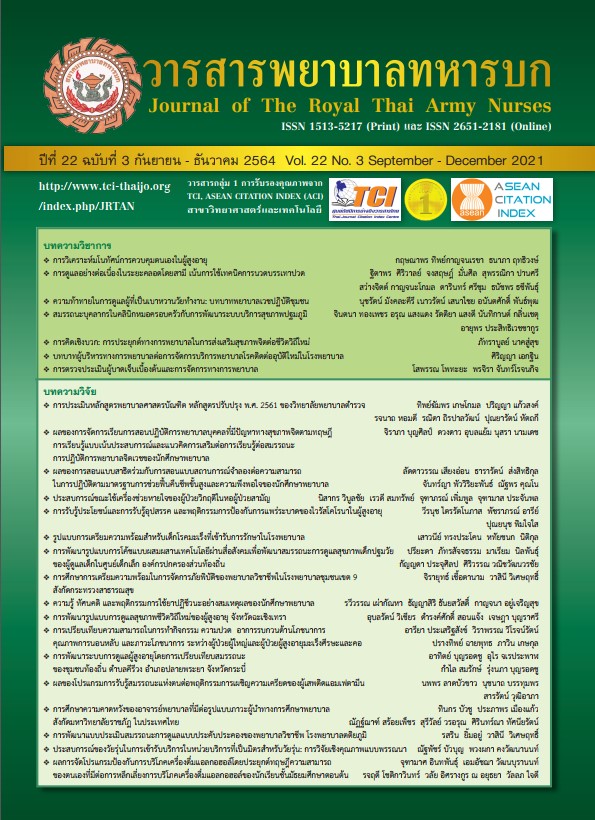Model of Preparation for Children with Cancer Who Received Therapy in A Hospital
Keywords:
Model of preparation, Children with cancer, HospitalizationAbstract
This purpose of this qualitative research was to study preparation model of children with cancer who hospitalization. This study was use two methods: a qualitative and an integrative review. Thirteen subjects were children diagnosed with cancer who hospitalized, caregiver, and health care providers were enrolled in qualitative study. Qualitative data were collected from in- depth interview, focus group discussion, non - participant observation and field note. Ten research papers were enrolled in integrative review study. Integrative review data were collected by integrative review five steps. Content analysis was analyzed for qualitative data. Matrix comparison and analytic induction were analyzed for integrative review data.
Results indicated that four major preparation domains for children with cancer who hospitalization emerged: (1) children with cancer preparation domain (2) caregiver preparation domain (3) health care services preparation and (4) preparation model outcome. The policy recommendations: the model of preparation for children with cancer who hospitalization should be suitable for the disease context and nature of the children. The model should be provided for children with cancer who hospitalization.
Downloads
References
World Health Organization. World cancer report 2017. World Health Organization, Geneva, Switzerland; 2017.
National Cancer Institute. Hospital based cancer registry annual report 2013. National Cancer Institute, Thailand; 2013. (in Thai)
Khamngoen R. Depression among children with cancer receiving chemotherapy. (Master of nursing science program, pediatric nursing). Faculty of Nursing, Chiang Mai University, Chiang Mai; 2002. (in Thai)
Treenai S, Chaiyawat W. Illness experience of adolescent patients with leukemia. Thai Journal of Nursing Council. 2006; 21(3): 47- 60. (in Thai)
Pharnit J, Chaiyawat W. Illness experience of school age patients with leukemia. Thai Journal of Nursing Council. 2007; 22(3): 41- 53. (in Thai)
Namkham S, Tangworapongchai J. The effect of a preparation program on self–care behaviors in school age children with leukemia during the relapse stage. Journal of Nursing Science & Health. 2014;37(3): 1-8. (in Thai)
Ngamsuoy A, Boonpeng P, Busabongpaiwon J. Effect of Preparation on Practice in Schoolage children cancer with Chemotherapy. Journal of Nursing and Education. 2007; 1(3): 70-80. (in Thai)
Rorty R. Feminism and pragmatism. Michigan Quarterly Review. 1991; 30: 231-258.
Miles MB, Huberman AM. Qualitative data analysis: An expanded sourcebook: Sage Publications; (1994).
Whittemore R, Knafl K. The integrative review: updated methodology. J Adv Nurs 2005; 52(5):546-553.
Coughlan M, Cronin P, Ryan F. Step-by-step guide to critiquing research. Part 1: quantitative research. Br J Nurs. 2007;16(11):658-663.
Holsti OR. Content analysis for the social sciences and humanities. Reading, MA: Addison-Wesley Publishing Company;1969.
Saengthong W, Hownarn C, Maneesri R. The effects of a preparation program on self-care behaviors of school-aged children with acute leukemia under chemotherapy during the initial stage of treatment. The Southern College Network Journal of Nursing and Public Health. 2020; 7(1): 58-168. (in Thai)
Sengul Z, Toruner E. Intervention protocol: Technology-based psychosocial motivation for children with cancer and their parents: A randomized trial. Asia Pac J Oncol Nurs. 2020;7(1):55.
Teepapal T, Punthmatharith B, Naphapunsakul M. Effect of self–help group on the psychological dimension of quality of life of adolescents with cancer. Songklanagarind Journal of Nursing. 2015; 35 (3):111-126. (in Thai)
Shoshani A, Mifano K, Czamanski-Cohen J. The effects of the make a wish intervention on psychiatric symptoms and health-related quality of life of children with cancer: A randomised controlled trial. Quality of Life Research. 2015;25(5):1209-1218.
Braam K, van Dijk-Lokkart E, Kaspers G, Takken T, Huisman J, Buffart L et al. Effects of a combined physical and psychosocial training for children with cancer: a randomized controlled trial. BMC Cancer. 2018;18(1):1289.
Taweesap P, Chancharoenrat W. The effectiveness of discharge planning among children with cancer at Thammasat university hospital: Thammasat University Hospital; 2012. (in Thai)
Haugen M, Landier W, Mandrell B, Sullivan J, Schwartz C, Skeens M, Hockenberry M. Educating families of children newly diagnosed with cancer: insights of a Delphi panel of expert clinicians from the children’s oncology group. J Pediatr Oncol Nurs. 2016; 33(6): 405-413.
Downing J, Thackrey D. Reading Readiness. New York: London, University of London press; 1971.
Pangam S., Anurathapan U., Torugsa S. Development of childhood cancer inpatient services at Somdech Phra Debaratana Medical Center of Ramathibodi Hospital. Journal of The Royal Thai Army Nurses. 2021; 22 (1): 205-215. (in Thai)
Downloads
Published
How to Cite
Issue
Section
License
บทความหรือข้อคิดเห็นใดใดที่ปรากฏในวารสารพยาบาลทหารบกเป็นวรรณกรรมของผู้เขียน ซึ่งบรรณาธิการหรือสมาคมพยาบาลทหารบก ไม่จำเป็นต้องเห็นด้วย
บทความที่ได้รับการตีพิมพ์เป็นลิขสิทธิ์ของวารสารพยาบาลทหารบก
The ideas and opinions expressed in the Journal of The Royal Thai Army Nurses are those of the authors and not necessarily those
of the editor or Royal Thai Army Nurses Association.






